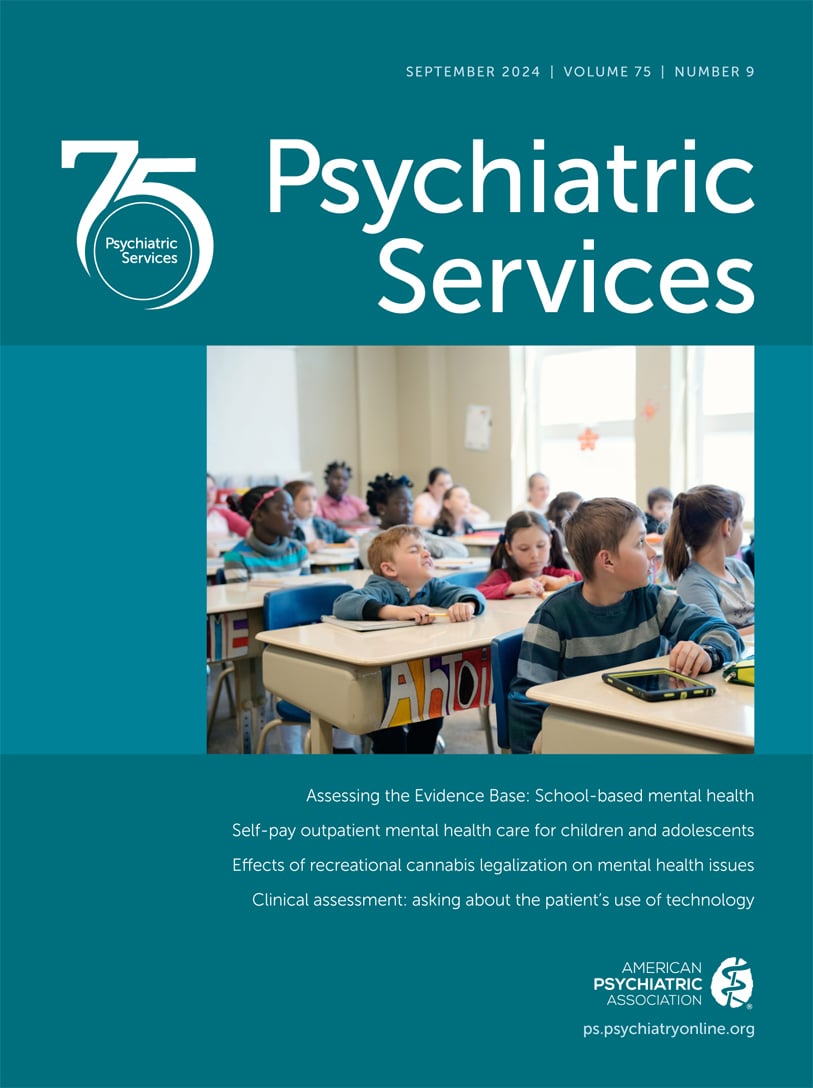Psychiatric Services
- Volume 57
- Number 3
- March 2006
Taking Issue
This Month's Highlights
Columns
Publication date: 01 March 2006
Pages302–304This column describes a private-public-academic collaboration in six states and the District of Columbia designed to provide evidence-based supported employment for persons with psychiatric disabilities by using best practices for program implementation. ...
https://doi.org/10.1176/appi.ps.57.3.302Publication date: 01 March 2006
Pages307–309Alcoholics Anonymous (AA) is described as a spiritual fellowship by many of its members, but its spiritual orientation needs to be better understood by clinicians and researchers. Spirituality is a latent construct, one that is inferred from multiple ...
https://doi.org/10.1176/appi.ps.57.3.307Article
Publication date: 01 March 2006
Pages317–324OBJECTIVE: Previous research has produced conflicting evidence about socioeconomic disparities in mental health care under universal health coverage in Canada. This study sought to determine equity in the delivery of ambulatory services from psychiatrists ...
https://doi.org/10.1176/appi.ps.57.3.317Publication date: 01 March 2006
Pages325–332OBJECTIVE: This study assessed the implementation of state Preadmission Screening and Resident Review (PASRR) programs with respect to identification of serious mental illness among nursing facility applicants and residents and access to mental health ...
https://doi.org/10.1176/appi.ps.57.3.325Publication date: 01 March 2006
Pages333–342OBJECTIVES: Many individuals with serious mental illness are on probation or parole. These individuals are twice as likely as those without mental illness to fail on supervision—that is, to have their community term revoked for a technical violation or a ...
https://doi.org/10.1176/appi.ps.57.3.333Publication date: 01 March 2006
Pages343–349OBJECTIVE: Outpatient commitment and a number of related civil court mechanisms are used to attempt to improve adherence to mental health treatment in the community. This study examined lifetime use rates and correlates of outpatient commitment or related ...
https://doi.org/10.1176/appi.ps.57.3.343Publication date: 01 March 2006
Pages350–355OBJECTIVES: Psychiatric advance directives allow competent persons to document advance instructions or designate a health care agent to communicate their preferences for future mental health treatment in the event of an incapacitating crisis. Although ...
https://doi.org/10.1176/appi.ps.57.3.350Publication date: 01 March 2006
Pages356–360OBJECTIVES: This study examined whether women with behavioral health needs are more likely to receive treatment for these problems in prison or in the community and to what extent prison disrupts or establishes involvement in treatment for these women. ...
https://doi.org/10.1176/appi.ps.57.3.356Publication date: 01 March 2006
Pages361–365OBJECTIVE: The purpose of this study was to characterize the nature of religious and spiritual support received by family caregivers of persons with serious mental illness and to test hypotheses that religiosity would be associated with caregiver ...
https://doi.org/10.1176/appi.ps.57.3.361Publication date: 01 March 2006
Pages366–372OBJECTIVES: Religious issues may be neglected by clinicians who are treating psychotic patients, even when religion constitutes an important means of coping. This study examined the spirituality and religious practices of outpatients with schizophrenia ...
https://doi.org/10.1176/appi.ps.57.3.366Publication date: 01 March 2006
Pages373–381OBJECTIVE: This study measured subjective life satisfaction among patients with long-term schizophrenia who were living in the community. METHODS: A representative national sample of 2,221 persons with schizophrenia who were discharged from psychiatric ...
https://doi.org/10.1176/appi.ps.57.3.373Publication date: 01 March 2006
Pages382–387OBJECTIVE: Professional services for persons with serious mental illnesses are underutilized. The genetics revolution has the potential to increase professional help seeking by increasing biomedical interpretations of mental illness among the public. The ...
https://doi.org/10.1176/appi.ps.57.3.382Publication date: 01 March 2006
Pages388–392OBJECTIVE: This research analyzed the extent to which self-reports of job-related discrimination by persons with serious mental illness are associated with econometric measures of discrimination. METHODS: Data were from the 1994-1995 National Health ...
https://doi.org/10.1176/appi.ps.57.3.388Open Forum
Publication date: 01 March 2006
Pages393–398Stigma impedes the life opportunities of people with mental illness. Research suggests that stigma may be reduced by three approaches: protest, education, and contact. Three programs that adapt these approaches for mass audiences are described: ...
https://doi.org/10.1176/appi.ps.57.3.393Brief Report
Publication date: 01 March 2006
Pages399–402OBJECTIVE: The study sought to better understand why some people with mental illness self-stigmatize and develop low self-esteem while others remain indifferent to stigma or respond with a sense of empowerment. The authors hypothesized that a high level ...
https://doi.org/10.1176/appi.ps.57.3.399Publication date: 01 March 2006
Pages403–406OBJECTIVE: Rates of hepatitis C (HCV) infection, testing, and treatment were compared among patients with schizophrenia, a substance use disorder, or co-occurring schizophrenia or schizoaffective disorder and a substance use disorder and a control group. ...
https://doi.org/10.1176/appi.ps.57.3.403Publication date: 01 March 2006
Pages407–409OBJECTIVE: A six-session version of a longer, 15-session social skills intervention for reducing high-risk sexual behaviors among men with severe mental illness was assessed. METHODS: Ninety-two men were randomly assigned to the intervention or to a two-...
https://doi.org/10.1176/appi.ps.57.3.407Publication date: 01 March 2006
Pages410–413OBJECTIVE: The purpose of this study was to assess racial differences in psychopathology and service use in a sample of African-American and Caucasian veterans. METHODS: African-American (N=253) and Caucasian (N=460) veterans from primary care clinics at ...
https://doi.org/10.1176/appi.ps.57.3.410Publication date: 01 March 2006
Pages414–416OBJECTIVE: The purpose of this study was to evaluate the effect of nominal incentive payments on attendance at therapy appointments among 50 low-income African Americans with depression. METHODS: Attendance at therapy appointments for depression without ...
https://doi.org/10.1176/appi.ps.57.3.414Frontline Reports
Letters
Book Reviews
Addendum
News & Notes
Past Issues
View Issues Archive
Vol. 75 | No. 12

Vol. 75 | No. 11

Vol. 75 | No. 10
